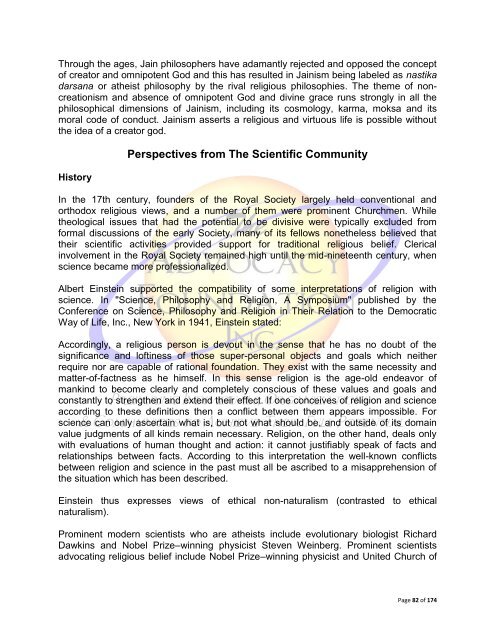The Gift of Spirituality
The Gift of Spirituality
The Gift of Spirituality
Create successful ePaper yourself
Turn your PDF publications into a flip-book with our unique Google optimized e-Paper software.
Through the ages, Jain philosophers have adamantly rejected and opposed the concept<br />
<strong>of</strong> creator and omnipotent God and this has resulted in Jainism being labeled as nastika<br />
darsana or atheist philosophy by the rival religious philosophies. <strong>The</strong> theme <strong>of</strong> noncreationism<br />
and absence <strong>of</strong> omnipotent God and divine grace runs strongly in all the<br />
philosophical dimensions <strong>of</strong> Jainism, including its cosmology, karma, moksa and its<br />
moral code <strong>of</strong> conduct. Jainism asserts a religious and virtuous life is possible without<br />
the idea <strong>of</strong> a creator god.<br />
History<br />
Perspectives from <strong>The</strong> Scientific Community<br />
In the 17th century, founders <strong>of</strong> the Royal Society largely held conventional and<br />
orthodox religious views, and a number <strong>of</strong> them were prominent Churchmen. While<br />
theological issues that had the potential to be divisive were typically excluded from<br />
formal discussions <strong>of</strong> the early Society, many <strong>of</strong> its fellows nonetheless believed that<br />
their scientific activities provided support for traditional religious belief. Clerical<br />
involvement in the Royal Society remained high until the mid-nineteenth century, when<br />
science became more pr<strong>of</strong>essionalized.<br />
Albert Einstein supported the compatibility <strong>of</strong> some interpretations <strong>of</strong> religion with<br />
science. In "Science, Philosophy and Religion, A Symposium" published by the<br />
Conference on Science, Philosophy and Religion in <strong>The</strong>ir Relation to the Democratic<br />
Way <strong>of</strong> Life, Inc., New York in 1941, Einstein stated:<br />
Accordingly, a religious person is devout in the sense that he has no doubt <strong>of</strong> the<br />
significance and l<strong>of</strong>tiness <strong>of</strong> those super-personal objects and goals which neither<br />
require nor are capable <strong>of</strong> rational foundation. <strong>The</strong>y exist with the same necessity and<br />
matter-<strong>of</strong>-factness as he himself. In this sense religion is the age-old endeavor <strong>of</strong><br />
mankind to become clearly and completely conscious <strong>of</strong> these values and goals and<br />
constantly to strengthen and extend their effect. If one conceives <strong>of</strong> religion and science<br />
according to these definitions then a conflict between them appears impossible. For<br />
science can only ascertain what is, but not what should be, and outside <strong>of</strong> its domain<br />
value judgments <strong>of</strong> all kinds remain necessary. Religion, on the other hand, deals only<br />
with evaluations <strong>of</strong> human thought and action: it cannot justifiably speak <strong>of</strong> facts and<br />
relationships between facts. According to this interpretation the well-known conflicts<br />
between religion and science in the past must all be ascribed to a misapprehension <strong>of</strong><br />
the situation which has been described.<br />
Einstein thus expresses views <strong>of</strong> ethical non-naturalism (contrasted to ethical<br />
naturalism).<br />
Prominent modern scientists who are atheists include evolutionary biologist Richard<br />
Dawkins and Nobel Prize–winning physicist Steven Weinberg. Prominent scientists<br />
advocating religious belief include Nobel Prize–winning physicist and United Church <strong>of</strong><br />
Page 82 <strong>of</strong> 174

















